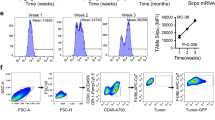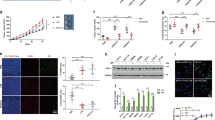Abstract
Cancer immunotherapies have greatly changed the prospects for the therapy of many malignancies, including colon cancer. Macrophages as the effectors of cancer immunotherapy provide considerable promise for cancer treatment. Prolyl 4-hydroxylase subunit alpha 3 (P4HA3) plays a cancer-promoting role in a variety of cancers, including colon cancer. In the present work, we provided evidence for the first time that P4HA3 promoted colon cancer cell escape from macrophage phagocytosis, and preliminarily explored its possible molecular mechanism. Immunohistochemistry was used to detect the expression of P4HA3 in tissues. Bioinformatics methods were used to analyze the tumor public databases (including TCGA database and GEO database). Macrophage phagocytosis assay and flow cytometric analysis were used to detect the phagocytic capacity of macrophages. Western blot and qRT-PCR were used to detect the expression of related markers (such as P4HA3, CD47, CD24, IL-34, and M-CSF). First, we found that P4HA3 was significantly and highly expressed in both colon cancer tissues and cells, and that P4HA3 had a positive correlation with lymph node metastasis, Dukes stage and also strongly correlated with poorer survival. Subsequently, we found that P4HA3 was strongly associated with the macrophage infiltration level in colon cancer. Immediately we also found that decreasing P4HA3 expression promoted macrophage phagocytosis in colon cancer cells, whereas P4HA3 overexpression produced the opposite effect. Finally, we demonstrated that P4HA3 promoted the expression of cluster of differentiation 47 (CD47) in colon cancer cells. Moreover, P4HA3 caused colon cancer cells to secrete Interleukin 34 (IL34) and Macrophage colony stimulating factor (M-CSF), which further induced macrophages to differentiate to M2 type and thereby contributed to the progression of colon cancer. We have demonstrated that P4HA3-driven CD47 overexpression may act as an escape mechanism, causing colon cancer cells to evade phagocytosis from macrophages.









Similar content being viewed by others
Data availability
Upon reasonable request, datasets generated and/or analyzed in the course of this study may be obtained from the corresponding author.
References
Sung H, Ferlay J, Siegel RL et al (2021) Global cancer statistics 2020: globocan estimates of incidence and mortality worldwide for 36 cancers in 185 countries. Ca-Cancer J Clin 71(3):209–249. https://doi.org/10.3322/caac.21660
Osterman E, Ekstrom J, Sjoblom T et al (2021) Accurate population-based model for individual prediction of colon cancer recurrence. Acta Oncol 60(10):1241–1249. https://doi.org/10.1080/0284186X.2021.1953138
Kaiser M, Semeraro MD, Herrmann M et al (2021) Immune aging and immunotherapy in cancer. Int J Mol Sci. https://doi.org/10.3390/ijms22137016
Chen W, Huang J, Xiong J et al (2021) Identification of a tumor microenvironment-related gene signature indicative of disease prognosis and treatment response in colon cancer. Oxid Med Cell Longev. https://doi.org/10.1155/2021/6290261
Pansy K, Uhl B, Krstic J et al (2021) Immune regulatory processes of the tumor microenvironment under malignant conditions. Int J Mol Sci. https://doi.org/10.3390/ijms222413311
Lei X, Lei Y, Li JK et al (2020) Immune cells within the tumor microenvironment: biological functions and roles in cancer immunotherapy. Cancer Lett. https://doi.org/10.1016/j.canlet.2019.11.009
Theocharis AD, Manou D, Karamanos NK (2019) The extracellular matrix as a multitasking player in disease. Febs J 286(15):2830–2869. https://doi.org/10.1111/febs.14818
Kolesnikoff N, Chen CH, Samuel MS (2022) Interrelationships between the extracellular matrix and the immune microenvironment that govern epithelial tumour progression. Clin Sci 136(5):361–377. https://doi.org/10.1042/CS20210679
Mushtaq MU, Papadas A, Pagenkopf A et al (2018) Tumor matrix remodeling and novel immunotherapies: the promise of matrix-derived immune biomarkers. J Immunother Cancer 6(1):65. https://doi.org/10.1186/s40425-018-0376-0
Vasta JD, Raines RT (2018) Collagen prolyl 4-hydroxylase as a therapeutic target. J Med Chem 61(23):10403–10411. https://doi.org/10.1021/acs.jmedchem.8b00822
Shi R, Gao S, Zhang J et al (2021) Collagen prolyl 4-hydroxylases modify tumor progression. Acta Bioch Bioph Sin 53(7):805–814. https://doi.org/10.1093/abbs/gmab065
Zhou H, He Y, Li L et al (2020) Overexpression of p4ha1 is correlated with poor survival and immune infiltrates in lung adenocarcinoma. Biomed Res Int. https://doi.org/10.1155/2020/8024138
Shang C, Huang J, Guo H (2021) Identification of an metabolic related risk signature predicts prognosis in cervical cancer and correlates with immune infiltration. Front Cell Dev Biol. https://doi.org/10.3389/fcell.2021.677831
Song H, Liu L, Song Z et al (2018) P4ha3 is epigenetically activated by slug in gastric cancer and its deregulation is associated with enhanced metastasis and poor survival. Technol Cancer Res. https://doi.org/10.1177/1533033818796485
Long R, Liu Z, Li J et al (2019) Col6a6 interacted with p4ha3 to suppress the growth and metastasis of pituitary adenoma via blocking pi3k-akt pathway. Aging (Albany NY) 11(20):8845–8859. https://doi.org/10.18632/aging.102300
Nakasuka F, Tabata S, Sakamoto T et al (2021) Tgf-beta-dependent reprogramming of amino acid metabolism induces epithelial-mesenchymal transition in non-small cell lung cancers. Commun Biol 4(1):782. https://doi.org/10.1038/s42003-021-02323-7
Zhou H, Zou J, Shao C et al (2022) Prolyl 4-hydroxylase subunit alpha 3 facilitates human colon cancer growth and metastasis through the tgf-beta/smad signaling pathway. Pathol Res Pract. https://doi.org/10.1016/j.prp.2021.153749
Hayat S, Bianconi V, Pirro M et al (2020) Cd47: role in the immune system and application to cancer therapy. Cell Oncol 43(1):19–30. https://doi.org/10.1007/s13402-019-00469-5
Eladl E, Tremblay-LeMay R, Rastgoo N et al (2020) Role of cd47 in hematological malignancies. J Hematol Oncol 13(1):96. https://doi.org/10.1186/s13045-020-00930-1
Yang H, Shao R, Huang H et al (2019) Engineering macrophages to phagocytose cancer cells by blocking the cd47/sirpa axis. Cancer Med-Us 8(9):4245–4253. https://doi.org/10.1002/cam4.2332
Li Z, Li Y, Gao J et al (2021) The role of cd47-sirpalpha immune checkpoint in tumor immune evasion and innate immunotherapy. Life Sci. https://doi.org/10.1016/j.lfs.2021.119150
Tan W, Tang H, Jiang X et al (2019) Metformin mediates induction of mir-708 to inhibit self-renewal and chemoresistance of breast cancer stem cells through targeting cd47. J Cell Mol Med 23(9):5994–6004. https://doi.org/10.1111/jcmm.14462
Rastgoo N, Wu J, Liu A et al (2020) Targeting cd47/tnfaip8 by mir-155 overcomes drug resistance and inhibits tumor growth through induction of phagocytosis and apoptosis in multiple myeloma. Haematologica 105(12):2813–2823. https://doi.org/10.3324/haematol.2019.227579
Wang Y, Xu Z, Guo S et al (2013) Intravenous delivery of sirna targeting cd47 effectively inhibits melanoma tumor growth and lung metastasis. Mol Ther 21(10):1919–1929. https://doi.org/10.1038/mt.2013.135
Barkal AA, Brewer RE, Markovic M et al (2019) Cd24 signalling through macrophage siglec-10 is a target for cancer immunotherapy. Nature 572(7769):392–396. https://doi.org/10.1038/s41586-019-1456-0
Specht E, Kaemmerer D, Sanger J et al (2015) Comparison of immunoreactive score, her2/neu score and h score for the immunohistochemical evaluation of somatostatin receptors in bronchopulmonary neuroendocrine neoplasms. Histopathology 67(3):368–377. https://doi.org/10.1111/his.12662
Wang S, Sun J, Chen K et al (2021) Perspectives of tumor-infiltrating lymphocyte treatment in solid tumors. BMC Med 19(1):140. https://doi.org/10.1186/s12916-021-02006-4
Peng L, Li Y, Gu H et al (2021) Mucin 4 mutation is associated with tumor mutation burden and promotes antitumor immunity in colon cancer patients. Aging (Albany NY) 13(6):9043–9055. https://doi.org/10.18632/aging.202756
Dienstmann R, Salazar R, Tabernero J (2015) Personalizing colon cancer adjuvant therapy: selecting optimal treatments for individual patients. J Clin Oncol 33(16):1787–1796. https://doi.org/10.1200/JCO.2014.60.0213
van den Bulk J, Verdegaal EM, de Miranda NF (2018) Cancer immunotherapy: broadening the scope of targetable tumours. Open Biol. https://doi.org/10.1098/rsob.180037
Anderson NR, Minutolo NG, Gill S et al (2021) Macrophage-based approaches for cancer immunotherapy. Cancer Res 81(5):1201–1208. https://doi.org/10.1158/0008-5472.CAN-20-2990
Lin H, Kryczek I, Li S et al (2021) Stanniocalcin 1 is a phagocytosis checkpoint driving tumor immune resistance. Cancer Cell 39(4):480–493. https://doi.org/10.1016/j.ccell.2020.12.023
Xing Q, Feng Y, Sun H et al (2021) Scavenger receptor marco contributes to macrophage phagocytosis and clearance of tumor cells. Exp Cell Res 408(2):112862. https://doi.org/10.1016/j.yexcr.2021.112862
Lin CY, Tsai CL, Chao A et al (2021) Nucleophosmin/b23 promotes endometrial cancer cell escape from macrophage phagocytosis by increasing cd24 expression. J Mol Med 99(8):1125–1137. https://doi.org/10.1007/s00109-021-02079-x
Matlung HL, Szilagyi K, Barclay NA et al (2017) The cd47-sirpalpha signaling axis as an innate immune checkpoint in cancer. Immunol Rev 276(1):145–164. https://doi.org/10.1111/imr.12527
Zhang Y, Sime W, Juhas M et al (2013) Crosstalk between colon cancer cells and macrophages via inflammatory mediators and cd47 promotes tumour cell migration. Eur J Cancer 49(15):3320–3334. https://doi.org/10.1016/j.ejca.2013.06.005
Ni YH, Zhao X, Wang W (2020) Cd24, a review of its role in tumor diagnosis, progression and therapy. Curr Gene Ther 20(2):109–126. https://doi.org/10.2174/1566523220666200623170738
Altevogt P, Sammar M, Huser L et al (2021) Novel insights into the function of cd24: a driving force in cancer. Int J Cancer 148(3):546–559. https://doi.org/10.1002/ijc.33249
Yin SS, Gao FH (2020) Molecular mechanism of tumor cell immune escape mediated by cd24/siglec-10. Front Immunol. https://doi.org/10.3389/fimmu.2020.01324
Pan Y, Yu Y, Wang X et al (2020) Tumor-associated macrophages in tumor immunity. Front Immunol. https://doi.org/10.3389/fimmu.2020.583084
Najafi M, Hashemi GN, Farhood B et al (2019) Macrophage polarity in cancer: a review. J Cell Biochem 120(3):2756–2765. https://doi.org/10.1002/jcb.27646
Osman A, Bhuyan F, Hashimoto M et al (2014) M-csf inhibits anti-hiv-1 activity of il-32, but they enhance m2-like phenotypes of macrophages. J Immunol 192(11):5083–5089. https://doi.org/10.4049/jimmunol.1302732
Segaliny AI, Mohamadi A, Dizier B et al (2015) Interleukin-34 promotes tumor progression and metastatic process in osteosarcoma through induction of angiogenesis and macrophage recruitment. Int J Cancer 137(1):73–85. https://doi.org/10.1002/ijc.29376
Lindau R, Mehta RB, Lash GE et al (2018) Interleukin-34 is present at the fetal-maternal interface and induces immunoregulatory macrophages of a decidual phenotype in vitro. Hum Reprod 33(4):588–599. https://doi.org/10.1093/humrep/dey037
Funding
This study was supported by Young Science and Technology Talent Support Project of Jiangsu Association for Science and Technology (TJ-2022-063), Natural Science and Research Plan of Huai’an City (HABZ202214), Medical Education Integration Research Special Fund in Jiangsu College of Nursing (YJRH202303), Open Subjects of Jiangsu Key Laboratory of Integrated Traditional Chinese and Western Medicine for Prevention and Treatment of Senile Diseases (202204).
Author information
Authors and Affiliations
Contributions
The experimental plan and protocol were conceived and designed by HZ, SH and AZ. Cellular molecular experiments are mainly completed by HZ and JZ. HZ and JZ have the equal contribution to this study. The other authors were mainly involved in data collection and data processing.
Corresponding authors
Ethics declarations
Conflict of interest
According to the authors, no conflict of interest exists that needs to be declared.
Ethical approval
The Ethics Committee of Lianshui People’s Hospital, affiliated with Kangda College of Nanjing Medical University, examined and approved all experiments of this study.
Additional information
Publisher's Note
Springer Nature remains neutral with regard to jurisdictional claims in published maps and institutional affiliations.
Supplementary Information
Below is the link to the electronic supplementary material.
Rights and permissions
Springer Nature or its licensor (e.g. a society or other partner) holds exclusive rights to this article under a publishing agreement with the author(s) or other rightsholder(s); author self-archiving of the accepted manuscript version of this article is solely governed by the terms of such publishing agreement and applicable law.
About this article
Cite this article
Zhou, H., Zou, J., Han, J. et al. P4HA3 promotes colon cancer cell escape from macrophage phagocytosis by increasing phagocytosis immune checkpoint CD47 expression. Mol Cell Biochem (2024). https://doi.org/10.1007/s11010-024-04927-z
Received:
Accepted:
Published:
DOI: https://doi.org/10.1007/s11010-024-04927-z




